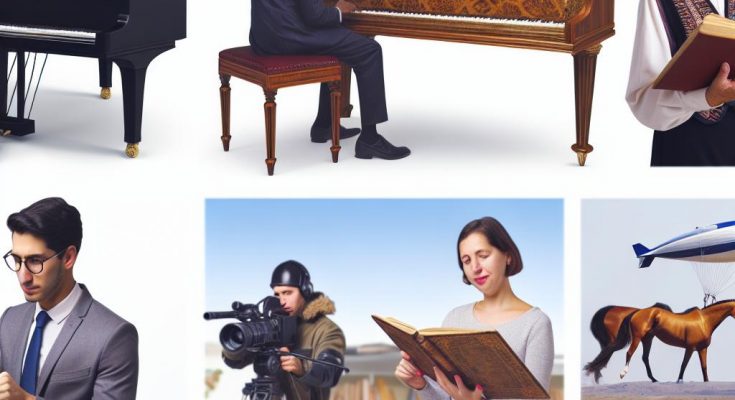Introduction to Expensive Hobbies
Engaging in hobbies is a widespread method for individuals to relax and derive enjoyment outside of their professional and domestic commitments. These activities are crucial for mental and emotional well-being, providing a break from everyday stresses. However, it is essential to acknowledge that not all hobbies are economically accessible; some possess significant financial demands. This document explores several of the most costly hobbies globally, elucidating why they incur such substantial expenses and what that entails for enthusiasts.
Yachting
Yachting stands as a quintessential example of a luxury pastime, predominantly associated with wealth and exclusivity. The initial investment involves purchasing a yacht, which can reach exorbitant figures depending on the size, brand, and customization features desired. Nevertheless, this purchase represents merely the surface of forthcoming financial commitments. The continuous maintenance of a yacht is imperative to ensure its optimal functionality and appearance, requiring regular services, repairs, and updates dictated by both usage and technological advancements.
Furthermore, docking fees constitute a significant recurrent expense. Premium docks demand higher prices for storage, particularly in popular locations revered for nautical activities. Complementing these costs, crew salaries add another layer of financial responsibility. Crews, comprising captains, engineers, deckhands, and stewards, ensure safe and enjoyable yachting experiences and their salaries, along with insurance and training costs, contribute extensively to the recurring expenses. Industry experts estimate that annual expenses for yacht maintenance and operation can approximate 10% of the yacht’s total value.
Collecting Cars
The car collecting realm, especially when it encompasses vintage or rare vehicles, represents an extraordinarily expensive pursuit. Collectors often spend millions at auctions acquiring historic or unique automobiles, driven by both passion and potential investment value. The allure of car collecting extends beyond ownership; it involves preserving and potentially enhancing the value of these historically significant machines.
Maintaining and refitting classic cars necessitate a substantial financial commitment. Unique parts, specialist labor, and authentic restoration processes ensure the longevity and value retention of these vehicles, thereby explaining the ongoing costs. Additionally, collectors are required to consider the expenses associated with secure storage facilities, designed to stave off environmental degradation and theft. These facilities often require climate control and specialized security measures, further augmenting the financial demands of this hobby.
Equestrian
Equestrian pursuits, encompassing activities from owning and training horses to indulging in equestrian sports, also rank as premium hobbies with considerable financial implications. The initial acquisition of horses requires a high upfront investment, and the breed, training, and pedigree of the horse can significantly impact the cost. Beyond purchase, the necessity for stables, specialized equipment, and appropriate gear adds to the initial expenses.
Training forms another critical component in this hobby, with professional trainers working to hone the skills of both horse and rider. Veterinary care further escalates expenses, essential for ensuring the health and well-being of the horses, alongside necessary vaccinations, dental care, and emergency services.
Participation in competitive events, such as dressage or show jumping, not only demands further financial commitment but also includes travel, entry fees, and additional training sessions. The culmination of these diverse factors contributes to the high cost associated with equestrian hobbies.
Traveling
Traveling as a hobby, particularly when it incorporates luxury or exclusive experiences, can also result in significant financial output. The pursuit of wanderlust can entail extravagant accommodation preferences, private tours, and adventurous or exotic trip itineraries. Enthusiasts with a penchant for travel incur substantial expenses related to transportation—frequently involving airfare, which escalates with class preferences—and the costs of high-end lodging facilities that ensure comfort and quality service.
In addition, the pursuit of unique experiences might involve considerable costs for access to seminars or curated events that promise cultural enrichment or entertainment. To explore additional luxurious travel experiences, visit Luxury Travel Magazine.
Art Collection
Collecting art is another hobby renowned for reaching impressive financial heights. High-value artworks, particularly creations by established or legendary artists, can be sold for millions of dollars at prestigious auction houses. Collectors who delve into this arena often weigh both aesthetic appreciation and investment potential when acquiring art. The process of acquiring pieces requires extensive knowledge, sourcing, and often guidance by industry experts to assess authenticity and market trends.
Besides acquisition costs, art collectors must consistently consider insurance premiums, necessary to protect their investment against damage or theft. Security measures are paramount for both households and gallery displays, prescribed by the value and significance of the collection. Moreover, appropriate environmental control for preservation ensures longevity, involving specialized lighting, humidity regulation, and regular monitoring. For insights into art investment considerations, visit Art News.
Flying
Taking to the skies in a private aircraft stands as a testament to extravagance, demanding both a significant financial commitment for purchasing a plane and ongoing costs related to its upkeep. The overhead involved is multifaceted; regular maintenance to ensure safety, fueling, hangar storage, pilot fees, and insurance collectively form a considerable expenditure category.
Learning to fly amplifies the fiscal responsibility associated with this hobby. Aspiring pilots cover costs for flight school, licensing, and continuous training necessary to refine and maintain flying proficiency, ensuring adherence to aviation standards and regulations.
Wine Collection
Wine collection emerges as a costly yet rewarding hobby, especially when curating selections of rare vintages and fine wines. The pursuit goes beyond mere acquisition—discerning collectors understand the nuances of wine quality, provenance, and market values, often guided by expert advice. Procurement of esteemed wines at auctions or from wineries can involve substantial financial outlay, with certain bottles appreciating sharply over time.
Proper storage facilities, an important factor in maintaining wine quality, further elevate costs. Dedicated wine cellars equipped with climate control are crucial for preserving the integrity and flavor of the collections, protecting them from temperature fluctuations and light exposure. The insurance for valuable collections also contributes to ongoing costs. For more information on wine investment, visit Wine Enthusiast.
Conclusion
The hobbies discussed draw enthusiasts willing to invest significant time and resources into their passions. Despite substantial financial barriers, these hobbies offer distinct experiences and opportunities for those equipped to afford them. Understanding the associated costs allows prospective hobbyists to prepare and plan accordingly, ensuring that their endeavors remain sustainable and fulfilling over time. Aspiring individuals must assess the fiscal and temporal investments required, making informed choices that align with their interests and resources.





